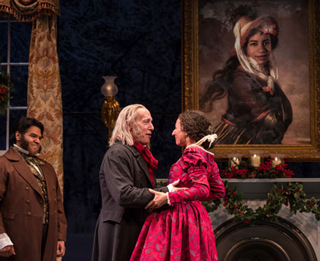
Over the 39 years that the Goodman Theatre has presented Tom Creamer's adaptation of A Christmas Carol, its various directors have reminded us that Charles Dickens' tale of a lonely misanthrope restored to humanity through divine intervention has its counterpart in every culture the world over. Indeed, to declare the themes of this popular fable universal, wholly transcending the circumstances of their origins, is no exaggeration.
These innovations have encompassed actors of African and Asian descent performing alongside Anglo-European players in a once-predominantly male landscape, but recently giving way to a more gender-integrated milieu. The 2016 Goodman production, however, marks the first in which Fred—the nephew whose birth took the life of Scrooge's beloved sister, leading his uncle to banish the young relative he blames for his bitter loss—has been transformed into a niece. The newly-christened Frida is played by returning cast member Kristina Valada-Viars, previously seen in 2014 and 2015 as Fred's wife, Abby.
It's not enough just to affix a feminine suffix to Fred's name or dress him up in a skirt and corsets, however—not when your adaptation retains its setting during the early years of Victoria's reign. While the current text might not overtly reference the additional backstory explaining Frida's presence in London's business district on Christmas Eve, instead of at home making preparations for the next day's festivities, director Henry Wishcamper recognizes the usefulness of providing context in governing the characters' actions, pursuant to presenting an environment unimpaired by unanswered questions.
Women were not permitted at the time to hold public office—Scrooge is safe in suggesting that his eloquent relative "run for Parliament"—but they participated fully in civic affairs, helming reform societies and organizing charity drives. We never learn what Frida's husband does for a living (though Scrooge sneering, "What right have you to be happy? You're poor enough!" precludes her having married a playboy out of Jane Austen), but we may assume that his income permits the hire of at least one household servant. Having dispatched this domestic employee home with the holiday supplies, Frida is now free to look in on her estranged uncle before meeting her spouse at his office, both returning together to their modest suburban residence (the door where Scrooge arrives on Christmas Day to share dinner with his family bespeaking a one-story dwelling rather than a Town House).
"[The Goodman Theatre] A Christmas Carol has long been at the vanguard of inclusive casting." says director Henry Wishcamper, "Every production creates new resonances throughout the course of the play, and the real-life events over the last few weeks have introduced many moments resonating differently now than before the election. Our goal has always been to present a picture where all of Chicago can see themselves, and a female Fred is merely an extension of this concept."
Valada-Viars concurs, "For the last two years, I've sat in the dressing room listening to Fred's speech in the first scene where he describes the spirit of the season as something, not explicitly religious, but sacred, nevertheless. The whole notion of treating those less fortunate than we are as 'fellow passengers to the grave, and not another race of creatures bound on other journeys'—this impacts the way I move through this city, how I vote, how I spend my time and money. Consider, too, Fred's simple invitation to Scrooge, 'come and dine with my wife and me tomorrow'—after a lifetime of scorn and rejection! I'm thrilled and thankful for the opportunity to add my voice to this story."
A Christmas Carol runs at the Goodman Theatre through December 31.
Mary Shen Barnidge
Contributing Writer

 Follow Us On Twitter
Follow Us On Twitter